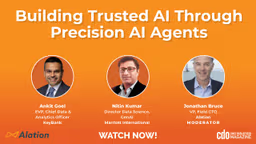Leadership
We Must Frame Our Work Around the Value It Creates for the Organization — ServiceNow CAO
Written by: CDO Magazine Bureau
Updated 12:00 PM UTC, Mon September 15, 2025
ServiceNow, a global leader in digital workflow automation, powers mission-critical operations for most Fortune 500 organizations. The company’s cloud-based platform integrates AI to streamline processes, enhance decision-making, and deliver measurable business value.
In the final installment of this three-part series, Vijay Kotu, Chief Analytics Officer at ServiceNow, continues his discussion with Vamsi Duvvuri, TMT AI Leader at EY. Their conversation explores how agentic AI is reshaping process optimization, prioritization of relationships for success in data and AI, the critical role of trust in AI adoption, AI as a catalyst for informed conversations, and what leaders should prioritize as they navigate the next wave of transformation.
Part one of the interview examined trust and strategic focus, the evaluation of AI use cases, and the importance of embedding governance into AI. Part two looked at the evolving landscape of AI integration and data strategies, the shift toward agentic AI, and the drive to create business value.
From flowcharts to flexible execution
Kotu draws a clear distinction between traditional deterministic workflows and the emerging promise of agentic AI. Conventional approaches, he explains, rely on hard-coded logic with step-by-step flows that may look clean on paper but often grow tangled in practice.
“A flowchart is best looking when you start. But when you run the process many times, you can see it’s taking all the direction there, and that’s where the clue of some of the things lies,” he says.
Agentic AI, by contrast, introduces flexibility. Instead of rigidly following prescribed steps, it can experiment and adapt, reordering tasks to see if outcomes can be achieved faster. “Maybe there’s a better way to solve it, and it is going to be thinking through, oh, should I just invoke that particular task? Might be task number seven first versus task number three that I’m supposed to invoke,” Kotu explains.
While this nondeterministic approach opens doors to global optimization, it also brings risks. Kotu acknowledges that “you don’t want that process to go on hay,” stressing the need for strong controls to ensure stability.
Relationships as the foundation of AI success
For leaders stepping into the AI space, Kotu emphasizes that success primarily depends on relationships. “At the end of the day, we are in the service of the rest of the organization, and that could be product teams, sales teams, marketing teams, or finance executives. It doesn’t matter. We are in the service of those people, and for this to work, they should trust the outcomes that we are providing,” he says.
Trust, he argues, is built on both relationships and demonstrated value. “We would need to frame our work in the value that we are adding for the organization. It brings more relevance for the business.”
Avoiding the pitfalls of broken trust
When asked about situations where trust falters, Kotu underscores the importance of communication. “No one would like to be surprised,” he notes. Kotu stresses that stakeholders must be brought along on the journey, even if disagreements remain. Presenting a finished analysis without context or transparency only undermines confidence.
Far from replacing human interactions, AI should enrich them, he states. “AI is a profoundly new, interesting, and promising way to solve many of the same business problems.”
Kotu agrees with the idea that the purpose of AI is “not to replace conversations but to have more conversations.” In his view, the real power lies in enabling “even better conversation, even more informed conversations.”
By combining predictions, richer datasets, and sharper insights, AI enhances the way business leaders engage with challenges and opportunities. As he points out, the actions executives must take often remain the same; what changes is the quality of information guiding them.
AI at an inflection point
Looking ahead, Kotu is both cautious and optimistic about the future. Predicting specifics, he admits, is difficult. “I would not be able to predict with a great sense of certainty on this one. Because just looking at the past, no one would have imagined the effect of or the impact of AI in the last few years,” he reflects.
Still, he sees today as a historic turning point. “Where we are right now, it’s truly a huge inflection point. And that is going to only accelerate and continue,” he says. What excites him most is the dual role leaders now play in not just riding in the “front seat” of technological change but often in the “driver’s seat,” shaping how AI is applied.
In conclusion, he says, “My objective, the one that makes me very excited, is how do we leverage this technology responsibly? And we have that opportunity to do that… It’s really exciting for me to be in this moment.”
CDO Magazine appreciates Vijay Kotu for sharing his insights with our global community.






